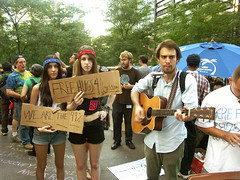Office Hours sat down with Catherine Squires to discuss her September 2012 article in American Quarterly, Coloring in the Bubble: Perspectives from Black-Oriented Media on the (Latest) Economic Disaster. This is a great podcast to keep on hand for use in any class on race relations or any discussion on the recent economic crisis.

In this podcast, Squires explains how people of color were scapegoated by the mainstream media in responding to the sub prime mortgage crisis. Squires then explores how three publications that are targeted to African Americans or people of color more generally responded to this crisis. The podcast is a great discussion of how neoliberalism and notions of “post-racialism” allow for stereotypes of people of color to remain unexamined and allow people of color to be scapegoated for social problems, even in this case of obvious fraud by lending companies.
We recommend the following discussion questions and activity to get students engaged with this topic:
1. How does Squires define “neoliberalism”? Were you familiar with this political philosophy before listening to this interview? Have you recognized the elements of neoliberalism in political discussions recently?
2. How does Squires define “post-racialism”? Were you familiar with this ideology before listening to this interview? Have you seen this ideology expressed by politicians? by your family and friends?
3. In what ways did Squires find that people of color were blamed for the sub prime crisis?
4. According to Squires, how did the ideologies of neoliberalism and post-racialism lend support to the blaming of people of color (instead of focusing on racist practices by the lending companies)?
5. Take a look at the three news outlets that Squires examines in this paper: Black Enterprise, The Root, and Colorlines. Take a few minutes to look over each site. How do they seem similar and different? According to Squires, how did each of the news sources respond differently to the economic crisis?
6. Is Squires optimistic that these news sources created by and for people of color have the ability to challenge dominant narratives about people of color? Why or why not?


